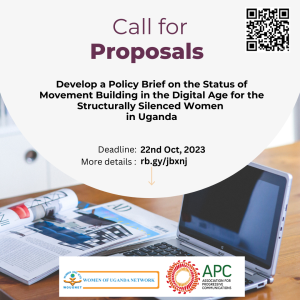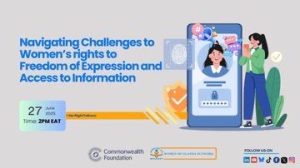
On Wednesday, 13th August 2025, digital rights advocates, gender activists, and civic space defenders convened online under the hashtag #HerRightToKnow for a vibrant Twitter (X) conversation hosted by Women of Uganda Network (WOUGNET) in with support from the Commonwealth Foundation. The dialogue centered on “Gender-Inclusive Solutions for Expanding Women’s Freedom of Expression and Access to Information.”
Key Reflections
Throughout the chat, participants reportedly emphasized that freedom of expression for women in Uganda and globally remains deeply shaped by online safety, digital literacy, and inclusive legal frameworks.
Participants highlighted that women continue to face disproportionate levels of online harassment, intimidation, and surveillance. It was noted that digital platforms could become safer for women by integrating stronger gender-sensitive reporting systems, improving content moderation in local languages, and prioritizing transparent enforcement mechanisms. Some contributors added that platforms should invest in digital self-defense training, provide anonymous reporting channels, and collaborate more closely with women-led civil society groups to co-design safety tools.
The conversation also stressed the urgent need for policies on freedom of expression and access to information to speak directly to women’s lived experiences. Many participants argued that legislation in Uganda could be strengthened by embedding explicit protections for women journalists, activists, and online users, and by ensuring that laws acknowledge forms of gender-based online violence that often silence women’s voices.
“Governments must develop and implement comprehensive laws that specifically address technology-facilitated gender-based violence. These laws should hold both perpetrators and digital service providers accountable.” Viola Kataike suggested.
Stakeholders further explained that a gender lens was essential when assessing how policies intersect with patriarchy, social norms, and structural inequalities that restrict women’s ability to seek, share, and use information.
It was also observed that gender considerations are still too often an afterthought in legislative processes. The X chat participants emphasized the need for gender impact assessments during bill drafting, and for ongoing consultations with women’s rights organizations, especially when evaluating laws that regulate speech or information access. Some also suggested creating gender-inclusive parliamentary committees and strengthening collaboration between lawmakers and digital rights researchers.
Furthermore, participants pointed out that any discussion on freedom of expression must address the realities of groups that are routinely marginalized such as rural women, women with disabilities, indigenous communities, and LGBTQ+ individuals. It was suggested that legal mechanisms such as affirmative protections, accessible complaint procedures, and inclusive data policies could help ensure that these communities enjoy equal and safe access to information and digital spaces. There was also strong emphasis on bridging the urban-rural digital divide, which continues to restrict the voices of women outside major cities.
Throughout the discussion, participants repeatedly underscored the need for legal literacy that is both accessible and culturally sensitive. It was reportedly recommended that programs should use local languages, blend online and offline outreach, and partner with community-based women’s groups. Many noted that empowering women with knowledge of their rights was one of the most effective ways to strengthen their ability to claim space both online and offline. Storytelling, peer learning, and simplified legal guides were cited as creative methods to demystify complex legal concepts for diverse audiences.
“To enhance women’s expression online, legal systems need stronger anti-harassment safeguards. In addition, women’s digital literacy needs to be enhanced. Many of them need to be trained in how to maintain an online presence without endangering their rights.” Lorna Nagawa
The #HerRightToKnow conversation reaffirmed a shared commitment to building a digital and legal environment where women and girls in Uganda can speak, create, critique, and access information without fear. As the momentum continues, WOUGNET remains committed to translate these reflections into concrete reforms and community-led initiatives that safeguard every woman’s right to know, to speak, and to thrive.
Explore insights from the chat here: https://x.com/wougnet/status/1955165901742895318?s=20
Compiled by: Irene Marunga Katushabe
Communications Associate





